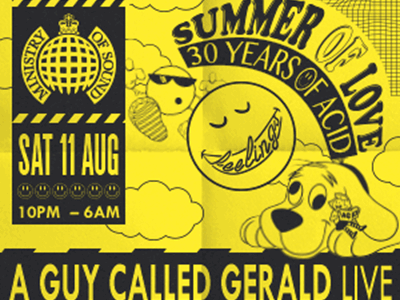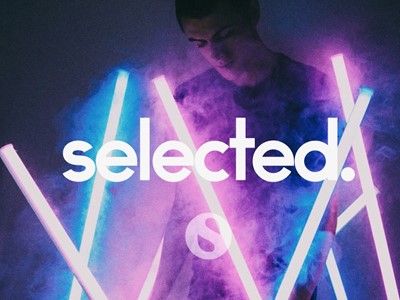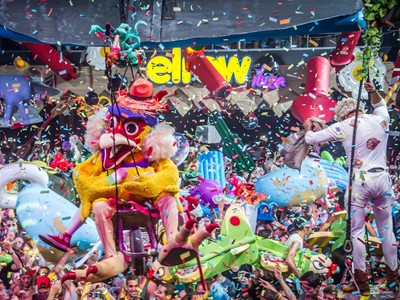Two seminal members of the early dubstep scene come together as the seminal night celebrates its 10th birthday.
Outside a pub on Effra Road, the bass kicks out of an estate car that’s seen better days. Sgt Pokes turns and acknowledges the sound, grins. “Brixton.” As the centre point of a movement that started over ten years ago, DMZ will return to Brixton to celebrate a decade of seminal club nights that grew from a small community in Croydon.
Sgt Pokes, DMZ’s host and subsequent MC for the likes of Skream and Magnetic Man is joined by Georgina Cook, a photographer whose pictures of the time are now iconic visual representations of dubstep. Images of young men in dark rooms, stood gazing intently at the decks all carry her stamp, now the unofficial shooter of the early days of DMZ and FWD.
After struggling to find relevance in documenting established music scenes, she remembers the moment of clarity that turned her lens to what was starting up in Croydon. “I’d always thought, what am I adding by taking photos of something that’s being going a long time? Then Mala played me “Be”. We were sitting in his car outside The Black Sheep Bar, and I struggled to contain myself. I thought immediately ‘I have to be involved in this.’ It was that feeling of finally, something I can add to”.
Both light up at the mention of the track Pokes refers to as ‘DMZ 001’. “It was the one. It It was crazy. There was this mad tension on the tune, there were these flanging notes on it. I thought, ‘I’m in. I’m in.’” The movement spread “like kinetic energy”, creating a group connected before the days of WhatsApp by music that called for people to “come meditate on bass weight”.
DMZ in its first incarnation, Dub Sessions, was a place for artists and DJs to “roll out” went from Croydon, to Shoreditch, before landing permanently in Brixton. “There was this small triangle here where things went on… For us it was about doing something here, the political and musical heritage of Brixton made it a natural step.”
The parties, initially attended by DJs and producers who would go to hear their tunes played out, grew until audiences were coming from out of London to join in. The ‘foreign’ presence of the nights became crucial to their success, as heads would travel up and down the country in coaches to attend similar parties in what Pokes affectionately refers to as dubstep ‘territories’.
“It feels weird to call it territories, but this sound was conquering, and these cities were opening their doors and sneaking us in like a Trojan Horse.” Two coach loads of producers, DJs, photographers and fans would head up North: “you’d get there, and you wouldn’t be able to get through the door for a queue of Leedsheads”.
In an era of Facebook events, Resident Advisor rankings and overblown door prices, it seems bizarre that such a sound could have travelled without the on hand use of the internet. George describes it as a “beautiful era… a really nice transition, you’d meet your mates from Croydon and East London, get CDs, and at the same time you could go online and get extra information.”
Platforms like the dubstep forum became essential online spaces for people to continue their discussions outside of DMZ, and the popularity of the genre continued to grow.
“Being there at that burgeoning point, people knew they were part of this thing. It was completely inclusive, there was no VIP. DJs were mingling with the crowd, you could go up to any DJ and producer and they wanted to chat to you openly” Pokes remembers. Mala would later say to Fact Magazine: “Our vibe is about positivity and making people feel welcome. For us, DMZ is like inviting people into our own living room.”
The sound travelled “like kinetic energy”, before long reaching the States. Core acts had started getting bookings of their own, and by the time of the fifth birthday, dubstep as a genre had migrated to somewhere quite far from where it had started. “You started to hear tunes from producers who weren’t maybe on that starting line-up. More tunes started passing around that sounded a bit like this, a bit like that... It was moving away from slouchy, eyes down sort of mood.”
Dubsteps’s crossover into the mainstream came via pop remixes and tracks that held an unexpected mainstream appeal, though for its originators, the effect had surpassed them. In a recent article for VICE, Coki describes how he was ‘blind’ to what was going on in the wake of his success. “All that time, people would say to me, ‘Bruv you're big, you know? Why are you sitting in an office?’ – and I didn't have a clue. I was blind to what was going on.”
As DMZ moved into the century’s second decade, its founders and fans continued to make their own way. As a fan standing in front of the decks, George noticed the change in pace that perhaps overtook itself once in the hands of producers not from the core centre of DMZ. ‘I saw it like a cartoon. A producer would wake up in the morning and think “I’m going to make a dubstep tune and it’s going to sound like this’ but the really good ones would continue to make original music.”
Enter labels like Kode9’s Hyperdub and Loefah’s Swamp81, responsible for putting out music that nurtured the energy and spirit born on the dancefloors of DMZ nights. Enter acts like Magnetic Man and Katy B, who proved that mainstream dubstep could, and should, be given respect in the charts. DMZ has maintained its staying power through brostep, through Skrillex and through Taylor Swift , not to mention a million goat parodies.
What started in a bar in Croydon has gone around the world and back again. This Friday sees it return to right down the road from where it started. Pokes is understandably sentimental about the 10th birthday. “When it comes down to it being all of us, everything else just falls by the side. DMZ is DMZ... When we all come back together as one unit, that’s that… Ultimately it all comes down to us putting that energy down together.”
“The party will be bits of all of everything. That raw anticipation of the first three years, the sense of knowledge and understanding that came 5, 6 years down the line. It’ll be 10 years of knowledge”.
See Georgina's collection body of work right here: www.drumzofthesouth.com
Catch Sgt Pokes in the salon, amongst other places right here
For the best in dance music 24/7 tune into Ministry Radio.



